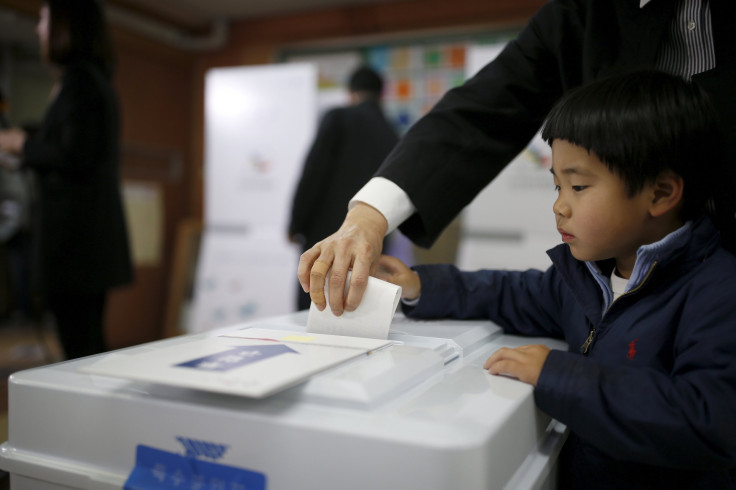South Korea Elections: President Park Geun-Hye Hopes To Consolidate Power

South Koreans are voting Wednesday in a parliamentary election where the conservative ruling Saenuri party’s performance is being watched closely to see if it can extend its majority to three-fifths of seats in the National Assembly. While local issues such as a worsening economy and rising youth unemployment are important factors, national security concerns — given the recent provocations from its neighbor, North Korea — could help the conservatives’ chances.
President Park Geun-hye, whose single term ends in about 20 months, has faced a legislative deadlock during her term as president because Saenuri currently has a very slim majority in the unicameral Parliament. Three-fifths, or 60 percent, of seats are needed to introduce bills and pass them in the 300-seat Parliament. Park, whose party won 152 seats during the last election in 2012, has blamed legislative inaction for not being able to implement structural reforms that would bring about economic changes.
Since Park took office in 2013, just about 30 percent of all bills introduced in the Parliament have been passed and key bills that have been stalled due to objections from the opposition include labor reforms and measures to reinvigorate the economy, the Straits Times reported.
Unemployment has been rising in the East Asian economy, particularly among those aged under 30. Youth unemployment reportedly grew to 12.5 percent in February, its highest level since 1999. Plunging exports, which have fallen for the past 14 months consecutively, and increasing levels of household debt, which has risen to a record $1 trillion, are among other big economic concerns, according to the Straits Times. Economic growth under Park has averaged 2.9 percent, compared with 3.2 percent under her predecessor.
“This is the first time I have voted ... our country desperately needs change, especially for young and jobless people like me,” Kate Kim, a 25-year-old college graduate without a job, told the Straits Times.
However, security concerns may override worries about the economy for many voters, given the recent provocations from North Korea, which conducted nuclear bomb and long-range missile tests earlier this year, and has also made statements threatening South Korea and Park.
Chung Hae-young, a businessman in Seoul, said he had voted for the ruling conservatives, hailing their hard-line stance toward Pyongyang, according to the Straits Times.
A Gallup Korea poll showed that fewer older Koreans were expected to vote in the Wednesday election, while the number of voters in their 20s was expected to rise, according to the Korea Times.
Elections to the National Assembly have traditionally been mainly a two-horse race between Saenuri and the chief opposition Minjoo Party of Korea, with smaller parties and independent candidates clutching only a handful of seats which don’t give them enough numbers to form parliamentary negotiating blocs.
According to surveys conducted by local pollsters, Saenuri could win between 150 to 175 seats, still short of the 180 seats it would need to unilaterally push bills through Parliament, Yonhap News Agency reported. Minjoo was expected to win fewer than 100 seats, while most of the remaining seats were forecast to be won by the new People’s Party, which was formed after a splinter group broke away from Minjoo earlier this year.
If the People’s Party wins over 20 seats, it would make history by effectively ending the country’s two-party political system.
Voters elect 253 members in the National Assembly, with the remaining 47 seats allocated to parties according to the number of overall votes they receive. Results are expected to be announced early on Thursday, local time.
© Copyright IBTimes 2024. All rights reserved.




















